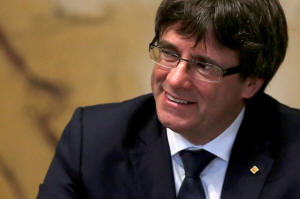|
Spain awaits next move by ousted Catalan
leader from Belgium
 Send a link to a friend
Send a link to a friend
 [October 31, 2017]
By Raquel Castillo and Angus MacSwan [October 31, 2017]
By Raquel Castillo and Angus MacSwan
MADRID (Reuters) - Spain's foreign minister
said on Tuesday he would be surprised if Belgium granted political
asylum to Catalan secessionist leader Carles Puigdemont, who turned up
there after Madrid's dismissal and takeover of Catalonia's regional
government.
By Tuesday, the Madrid government had gained the upper hand in the
protracted struggle over Catalonia's independence drive.
Resistance to Madrid's imposition of direct control on the autonomous
region failed to materialize at the start of the week on Monday. The
secessionist leadership is in disarray, and attention is now turning to
a regional election called by Prime Minister Mariano Rajoy for Dec. 21
as a way out of the crisis.
But Puigdemont, whose parliament declared an independent Catalan
republic on Friday before being removed by Rajoy, remains a thorn in
Madrid's side. He was due to make a statement later on Tuesday in
Brussels, where he was seen by journalists on Tuesday after having
dropped out of sight for 24 hours.

Spain's prosecutor called for charges of rebellion and other crimes to
be laid against him, which carry combined sentences of more than 30
years in prison. Spain's Supreme Court also began proceedings for
rebellion against the Catalan parliament speaker and other senior
lawmakers, a court spokesman said on Tuesday.
Any request for asylum in Belgium could lead to a diplomatic dispute
between the two European Union nations. But Spanish Foreign Minister
Alfonso Dastis appeared to play down that prospect for now.
"We have no certainty of what he is doing," he told Cadena Ser radio.
"We would be a bit surprised, given the situation regarding the right of
asylum in Europe, but the actions of ex-president Puigdemont are not
easy to foresee."
Any decision would be up to Belgian courts, not the government, Dastis
said. "If Belgium grants asylum to Puigdemont, it will not be a normal
situation. Let's leave it there for now."
In Belgium, Puigdemont's lawyer Paul Bekaert, a veteran human rights
advocate, told Reuters his client was considering seeking asylum but it
was not certain.
"We have not yet decided. We have a lot of time to decide," Bekaert
said. "We will see in the coming weeks what we are doing."

While Belgium has an unusual track record in refusing to extradite
Europeans wanted by other EU states, the main reason Puigdemont had come
was to address a wider audience for Catalonia's grievances against
Madrid, Bekaert said.
European nations including Britain, Germany and France have backed Rajoy
and rejected an independent Catalan state, although some have called for
dialogue between the opposing sides.
The Spanish government has also said Puigdemont was welcome to take his
chances and stand in the Dec. 21 election.
UNCERTAINTY TO BUILD
The political crisis, Spain's gravest in the four decades since the
return of democracy in the late 1970s, was triggered by an independence
referendum in Catalonia on Oct. 1.
Though it was declared illegal by Spanish courts and less than half
Catalonia's eligible voters took part, the pro-secessionist regional
government said the vote gave it a mandate for independence.
[to top of second column] |

Carles Puigdemont smiles as he chairs a meeting of the regional
government at the Palau de la Generalitat, the regional government
headquarters, in Barcelona, Spain September 26, 2017. REUTERS/Jon
Nazca/File Photo

Some prominent ousted Catalan leaders, including Puigdemont and Vice
President Oriol Junqueras, had said they would not accept their
dismissal. But their respective parties, PdeCat and Esquerra
Republicana de Catalunya, said on Monday they would take part in the
Dec. 21 election, a tacit acceptance of direct rule from Madrid.
Two opinion polls showed support for independence may have started
to wane. A Sigma Dos survey published in El Mundo showed 33.5
percent of Catalans were in favor of independence, while a
Metroscopia poll published by El Pais put that number at 29 percent.
That compared with 41.1 percent in July, according to an official
survey carried out by the Catalan government.
Opponents of secession say a majority of Catalans want to remain
part of Spain and did not take part in the referendum.
But some analysts say the dispute is not going to disappear anytime
soon despite the present state of play.
"Spain is heading for a period of disruption, and like the UK and
Brexit, having its policy agenda dominated by one political issue
while other key challenges fade into the background," said Raj
Badiani, an economist at IHS Markit in London.

"A more tangible impact from the crisis could evolve from early
2018, with the uncertainty set to build as Catalans push harder for
a legally binding referendum."
The government's move to impose direct rule received the backing of
several influential Catalan business lobbies, which called on firms
to stay in the region. The chaos has prompted an exodus of
businesses from Catalonia, which contributes about a fifth of
Spain's economy.
Credit rating agency Fitch late on Monday said the escalation of
tensions in Catalonia significantly worsened the outlook for Spain's
economic growth and could prompt negative action on the country's
rating.
In Barcelona, some people displayed exasperation.
"It's a farcical and completely ridiculous situation," said Ernesto
Hernandez Busto, a 42-year-old editor. "This extreme nationalism,
this separatism, has taken Catalonia to the most absurd situation
and the worst inconvenience we have had in the last 40 years."
(Additional reporting by Paul Day and Sonya Dowsett in Madrid,
Lucasta Bath and Clement Rossignol in Belgium; Editing by Janet
Lawrence)
[© 2017 Thomson Reuters. All rights
reserved.]
Copyright 2017 Reuters. All rights reserved. This material may not be published,
broadcast, rewritten or redistributed.

 |